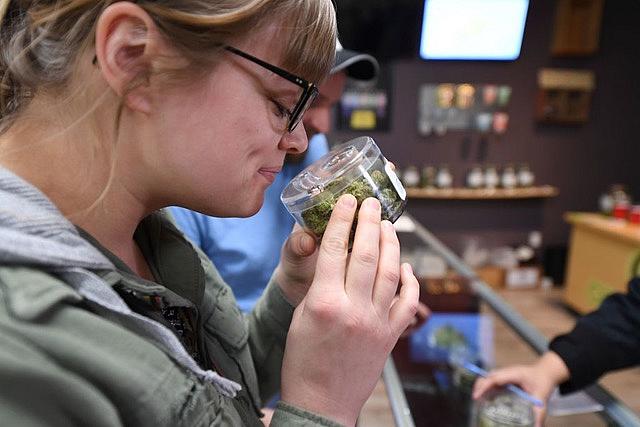Cannabis in the womb: How I reported on marijuana use during pregnancy and breastfeeding

(Photo by ROBYN BECK/AFP/Getty Images)
It is a plant, it’s legal and it has medicinal properties. Based on those three characteristics, many may think that marijuana is harmless. But according to doctors, this is a common misconception, especially among pregnant women. That may explain why marijuana is the most commonly used drug during pregnancy, according to the Office of the U.S. Surgeon General.
Stigma around marijuana, especially among mothers, was a big challenge to overcome while reporting my stories for the 2019 National Fellowship. First, I had to find women who openly used cannabis during their pregnancies or while breastfeeding their children and would be willing to share their experiences with others. There was no better place to start than the internet. I began to scrutinize social networks, and to my surprise, I found a considerable number of Facebook groups where women not only shared maternity tips but also their marijuana use during pregnancy.
Convincing those mothers to speak in front of the camera was my next challenge. None of the Latinas I contacted wanted to discuss their experiences openly, although I looked for mediators, such as nonprofit organizations that help Latino families and had worked with them in the past. Then I met a white woman who previously did not have problems talking about her experience with another media outlet, but she refused to retell her story to me. She was frustrated with the previous newspaper since she felt her interview was not a balanced version of her experience. I was still lacking a main character for my story.
After contacting several Internet groups, I met Kelly Bruce, co-founder of “Canna Mommy,” a virtual clinic. She lives in Arcata in Northern California, a region known as the Emerald Triangle, where the largest amount of cannabis in the United States is produced. Kelly was almost seven months pregnant with her fourth child, and, as with her previous pregnancies, she used marijuana to relieve back pain, nausea and other symptoms. Kelly is also a businesswoman, who together with her husband, runs a small cannabis-based soap and bath salt manufacturing company whose products mainly target pregnant women. Kelly agreed to tell her story, since she strongly believes that marijuana makes her a better mother by helping her manage her pain and stress. Kelly also contacted another woman living in the same area who also uses marijuana, while breastfeeding her 3-month-old son. Both Kelly and Nicole Nunez agreed to talk about their lifestyle choices and the reasons they decided to continue using marijuana, despite studies that indicate that cannabis can negatively affect a baby’s development.
Although the main characters of this story were not Spanish speakers, doctors and studies that have indicated that the increase in marijuana use during pregnancy is not limited to a single race. Latinas are included in statistics that show that pregnant women are increasingly using marijuana. According to Kelly and Nicole, all their children were born healthy with no health problems so far. However, health experts and studies show a higher risk for negative impacts on a child’s long-term learning and behavior if exposed to marijuana during pregnancy and breastfeeding.
My investigation consisted of three parts. One part focused on the legal issues confronting mothers who use marijuana and their children. To do this, I talked to the different parties involved when a baby tests positive for marijuana: doctors, hospital social workers, and Child Protective Services at the California Department of Social Services. Although these agencies agreed that just using marijuana is not itself evidence of child neglect, a thorough investigation should be carried out to rule out other risk factors. Although the definition of child abuse or neglect may vary from state to state, my investigation looked at how California and Fresno County government agencies approach the issue.
Another part of this investigation focused on different cannabis dispensaries and their response to pregnant women who ask about their products. Here I faced a new challenge. In Fresno, where I work as a television reporter, only medical marijuana dispensaries are allowed. Since marijuana was legalized in California, groups here have rallied for recreational marijuana dispensaries as well, but neither the city nor the county has approved these proposals. No local dispensary wanted to talk about this issue in front of cameras. Many said they preferred to keep a low profile for fear of retaliation, although they said they had everything in order. There are many conservative strongholds in California’s Central Valley. For this reason, I talked to other dispensaries during my trip to Eureka in Northern California, asking them if they recommended and sold marijuana products to pregnant women who wanted to lessen some of the discomforts of pregnancy.
Northern California was a different story. Dispensary owners and employees were not afraid to talk about this issue. Some admitted they suggested certain products when a pregnant woman asks for advice, while others said they only recommend products for external use rather than something to be ingested. Employees acknowledge that doctors do not recommend using marijuana, but they also argued there was a lack of research on the subject.
Currently, there is enough evidence for the medical community to recommend that pregnant women avoid marijuana use, although more studies are needed. Evidence gathered so far is based on studies conducted on animals, such as rats and zebras. No studies on humans are available due to ethical reasons, since using pregnant women for this kind of research could potentially affect their health and the baby. Until new studies are available, the Office of the U.S. Surgeon General, the American College of Obstetricians and Gynecologists, as well as the American Academy of Pediatrics, consider it best to refrain from using marijuana during pregnancy and breastfeeding.

